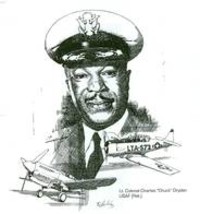Hall of Fame
Dryden, Lt. Colonel Charles E. "Chuck"

A native of New York City, Charles Walter Dryden studied mechanical engineering at City College of New York and earned his private pilot license in the Civilian Pilot Training Program. Three months prior to the attack on Pearl Harbor in 1941, Mr. Dryden enlisted in the Army Air Corps as a cadet. Sent to Tuskegee Army Flying School, a segregated training base in Alabama for Negro aviators, he became a member of 42-D, the second class graduated from the station. Dryden was assigned to the 99th Fighter Squadron, the first black United States military flying unit that was dispatched to North Africa under command of Lt Colonel Benjamin O. Davis, Jr. The inexperienced unit flew P-40s in air-ground support and medium bomber escort missions and soon earned the respect of senior officers, challenging initial skepticism in many quarters as to the ability of Negroes in flying and fighting. On June 9, 1943, Dryden was flight leader of six P-40s on patrol over the island of Pantelleria when they encountered Luftwaffe fighters escorting bombers on a mission to attack allied troops. In the 99th's first encounter with enemy fighters, Lieutenant Dryden led his flight, outnumbered by the enemy, to victory, damaging one enemy fighter and causing the enemy bombers to drop their bombs into the sea and retreat. The novice 99th suffered no damage. In October, 1943, Dryden returned to the United States to help train an all black fighter group to be designated the 332nd. As flight instructor at Selfridge Field, Michigan, and Walterboro Army Air Field, South Carolina, Dryden prepared hundreds of pilots for aerial combat. Shortly after the three original squadrons of the 332nd arrived overseas, they were joined by the seasoned 99th, and the all black group established itself as a well disciplined, successful fighting unit. As escorts, this group never lost a friendly bomber to enemy fighters-a distinction to which no other allied fighter group can lay claim. A career officer, Colonel Dryden served in the Korean War as a forward observer pilot who flew an unarmed plane behind enemy lines relaying valuable information to headquarters on location and movement of enemy forces. He retired from Lockheed Martin Aeronautical Systems Company in Marietta after 13 years and since has worked actively in the greater Atlanta area with young people in schools and churches. A source of inspiration for many who aspire to or have chosen careers in aerospace, he serves on the advisory board of Aviation Career Enrichment, Inc., a non-profit youth motivation organization in Atlanta. Inducted into the order of Daedalians in 1997, Colonel Dryden is author of A-Train: Memoirs of a Tuskegee Airman, released in April, 1997.
Lt Colonel Charles "Chuck" Dryden, an inspiration for so many, was enshrined in the Georgia Aviation Hall of Fame May 16, 1998.
